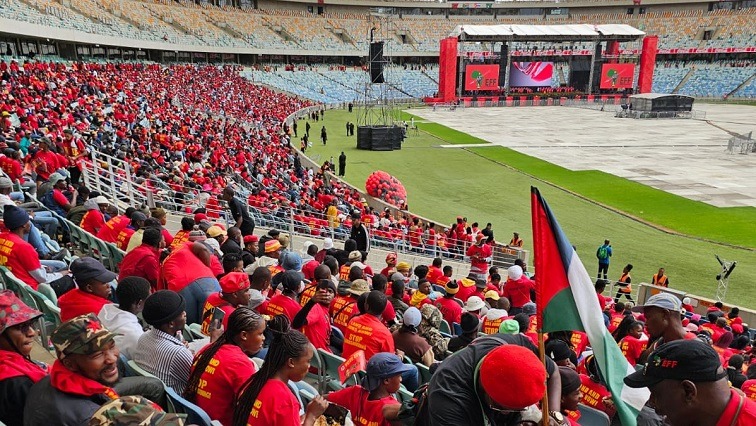Johnathan Paoli
EFF CIC has vowed to continue pursuing a land policy surrounding expropriation without compensation, an employment policy which effectively creates jobs through building state capacity, state-led and protected industrialisation; securing an efficient and stable power supply, emulating models such as those employed by China; and ensuring a free and decolonised education system which does not leave its students in the lurch.
This transpired at the EFF Manifesto launch at the Moses Mabhida Stadium in Durban on Saturday. Thousands of supporters almost filled the stadium while painting it red. Many South African political parties have been holding rallies in preparation for the highly contested 2024 National General Elections.
EFF CIC, Julius Malema delivered the manifesto, aiming to appeal to voters and outline the party’s vision for the country and said as the third-largest political party in the country, it remained confident about its prospects in the upcoming elections.
The party outlined its approach to land and said that the resolution of the land question would continue to be anchored on the principle of expropriation of land without compensation for equal redistribution and use, and for the State to be the custodian of all land in South
“What is our commitment? We are going to take the land and we are not going to pay a cent,” Malema said.
In relation to employment, Malema said that the EFF government would ensure the creation of millions of decent jobs between 2024 and 2029, through building state capacity, state-led and protected industrialisation, industrial diversification, the protection of infant and existing industries, the transfer of ownership to black people through subsidies, an increase in tariffs, and state-aided marketing and promotion of South African products internally, across the continent, and worldwide, with a focus on key, progressive, and most beneficial trading partners.
In terms of the power-crisis gripping the country, the CIC said that an EFF government would ensure the security of electricity supply for at least the next 20 years, emulating successful models like that of China, to foster national sovereignty and sustainable economic growth.
In addition the EFF government would invest in repairing the existing fleet of power generation and adopt clean coal technologies to enhance the energy availability factor and work to reduce the electricity demand of major electricity users, implementing strategies that are economically viable and sustainable, including revoking preferential tariff deals that offer below-cost electricity to certain corporations.
The president said that an EFF-led government would subsidise embedded electricity alternatives for public institutions such as public health facilities, schools and police stations and households to encourage the adoption of sustainable energy solutions, as well significantly invest in the transmission capacity to support the increased demand and integration of diverse energy sources.
In terms of education, Malema said that his government would introduce free, decolonised education for all, incorporating topics pertaining to indigenous knowledge, sovereignty, and economic freedom in the curricula; criminalise all parents who do not take their children to school, ensure that all schools have access to adequate sanitation, and eradicate all school structures built from inappropriate materials, such as mud and asbestos.
Malema described the election theme as well as the battle cry for this year as “Our land and jobs now! Stop Load Shedding!”; and describe the party as “a weapon that will be used against the enemy in the revolution”.
Malema said that he was very happy that the KZN comrades were able to fill up this stadium on their own, without comrades from other provinces and that it proved that the party was a national organisation and not a regional one.
INSIDE POLITICS



